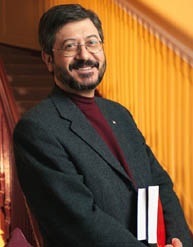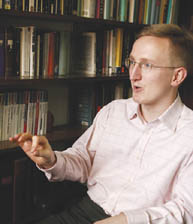Headliners: Musical kudos and the sweet science's not-so-sweet Hilton clan
Headliners: Musical kudos and the sweet science's not-so-sweet Hilton clan McGill University
User Tools (skip):
HEADLINERS
Musical kudos and the sweet science's not-so-sweet Hilton clan
Hitting the right notes
Seems like the McGill Contemporary Music Ensemble (CME) has struck a chord with Arthur Kaptainis, longtime classical music critic at the Montreal Gazette. In reviewing the Ensemble's recent tribute concert to György Ligeti, Kaptainis wrote that the group's sterling performance offered a "powerful case for equal billing" with the "more glamorous" McGill Symphony Orchestra. Kaptainis was so impressed with the ensemble under the leadership of Denys Bouliane, director of the McGill CME, that he ended the article by asking and answering a rhetorical question: "A student effort? Yes, but the sound was completely professional."
Sacks sings BRAMS' praises
Speaking of all things musical, in a recent interview with Maclean's magazine, distinguished neurologist Oliver Sacks said that music is such an innate part of human beings' neural wiring that it has powerful healing properties across a vast array of neurological conditions, from autism to Alzheimer's. In the article, Sacks had high praise for the BRAin, Music and Sound research lab (BRAMS), affiliated with McGill, the Montreal Neurological Institute and Université de Montréal, calling it "a world centre of neuroscience," and "an amazing coming together of people like [McGill professor] Daniel Levitin, who are both musicians and neuroscientists. I hope to be sending patients there soon—there's nothing else like it in North America. They're looking at all sorts of things I've wondered about for years."
Franco study gets worldwide pickup

Franco: Big screen(ing) star.
Dr Eduardo Franco, director of the Division of Cancer Epidemiology in the Faculty of Medicine, has been all over the world's mainstream media following publication of his study on a new HPV screening test that appeared in the New England Journal of Medicine. As reported widely in such media outlets as the New York Times, the Wall Street Journal, the Washington Post, Le Monde and ABC News, Franco's research demonstrates that the screening test is almost twice as accurate as a Pap smear in detecting pre-cancerous lesions. Experts suggest that the new test could replace the Pap in a matter of years.
Another black eye for boxing's Hiltons

Mole: Boxing's thug culture.
OWEN EGAN
After boxer Alex Hilton's most recent run-in with the law, during which he must have set some sort of record by being rearrested just hours after his acquittal on assault charges, not one, but two McGill experts were sought by the National Post to comment on Montreal's notorious Hilton family. It isn't at all surprising to English professor Tom Seymour Mole (who also specializes in cultures of celebrity) that promoters still look to sign the Hiltons as major draws for their fight cards, despite their lengthy history of egregious misdeeds. Because of boxing's violent image, run-ins with the law for the Hiltons only confirms "that kind of bad-boy image that they've already gone to some lengths to cultivate." Later in the article Jack Jedwab, a lecturer at the McGill Institute for the Study of Canada who teaches Sports in Canada, states that even by boxing's brutal standards, there are parallels between the strange car-wreck fascination that the public has for the Hiltons and the spectacle of pro wrestling.

